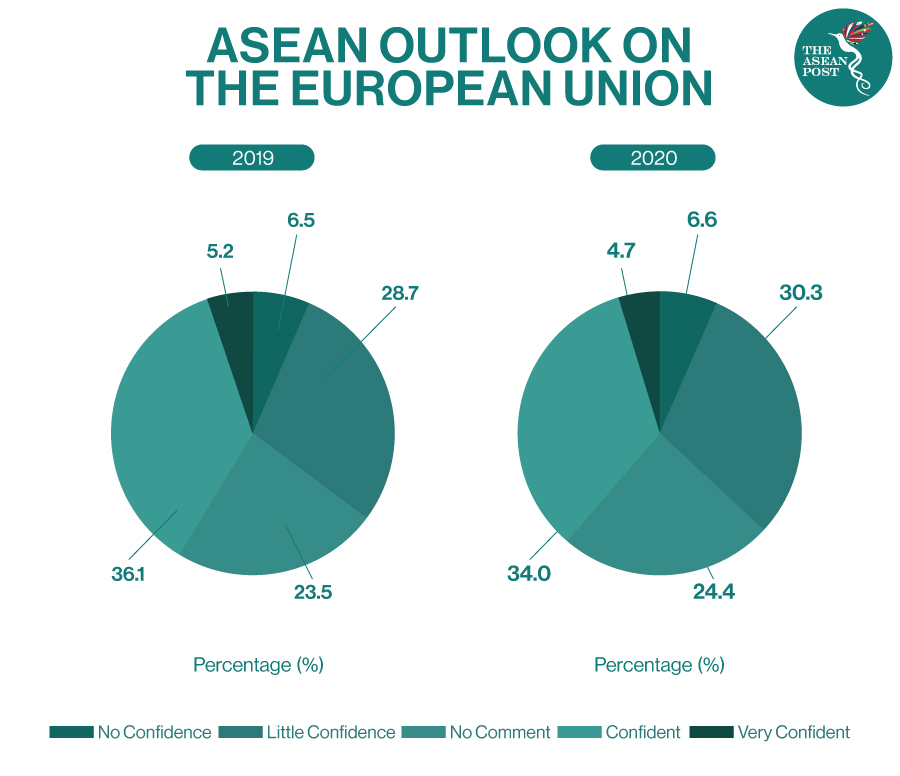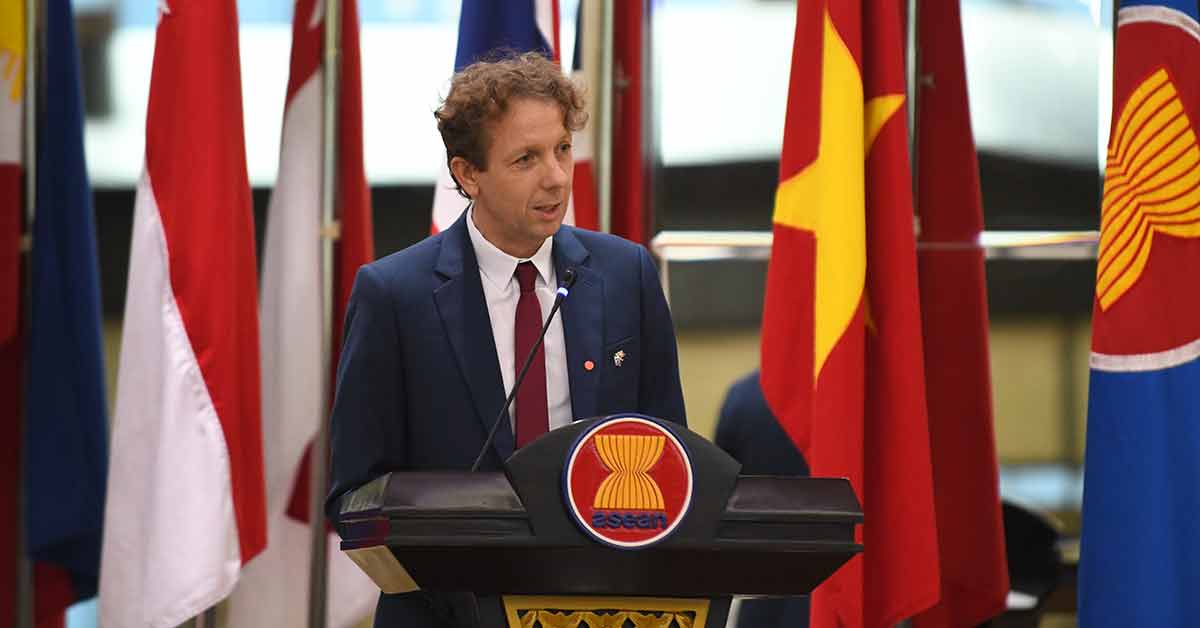In this exclusive interview for The ASEAN Post, Francesco Alberti speaks to His Excellency, Igor Driesmans, the European Union (EU) representative to ASEAN to discuss the relationship between the EU and ASEAN and the trade bloc’s role in today’s ever changing and increasingly polarised world.
What Is The Current State Of The EU-ASEAN Relationship?
“I would call the relationship excellent.”
The EU stands out in several ways among the ASEAN dialog partners. For instance, EU is the biggest contributor in development funding with over EUR200 million (US$236 million) invested in several projects aimed at improving connectivity and regional integration, among others.
“We are also the first investor in the region and have the most comprehensive engagement with over 20 teams working on topics that range from high-speed computing to the circular economy.”
On the political front, the EU attaches special importance to ASEAN centrality.
“That is to say that we want ASEAN to remain at the centre of the political structure that they have so successfully set up. To sum it up in a few words, it’s a dense and very successful relationship.”
What Is ASEAN’s Role In Terms Of Trade And Its Political Role On The International Stage?
On the trade front, ASEAN has worked very hard to build an Economic Community. It has been very successful in abolishing tariffs therefore facilitating trade. On the other hand, when it comes to non-tariff barriers (NTBs) these have gone up as highlighted in the ASEAN Integration Report of 2019.
“The EU is working to provide support in standards setting, trade facilitation and other fields to help eliminate NTBs. There is still a lot of untapped economic potential and we want to work toward the common goal of fully achieving free trade in the region.”
Whereas on the political side, ASEAN biggest strength is its “convening power.” No other organisation, not even the EU, has this power. ASEAN has managed to build a structure that includes all the world’s powers with itself at the centre. Often, in international meetings, heads of government and ministers would send their representatives, but when ASEAN calls a meeting, everybody shows up in person.
“This clearly shows the importance the world attaches to ASEAN.”
Where Are The EU And ASEAN In Terms Of Security?
“The EU has stepped up considerably its defense and security engagement with ASEAN. We now have a counterterrorism adviser based in Jakarta and engage with ASEAN in cybersecurity and maritime security to name a few examples. I would say engagement, especially in non-traditional security areas is expanding fast.”
“ASEAN expects from the EU support in upholding a rules-based international order and respect for international law, and we hope we can stand up to their expectations.”
Will the COVID-19 Pandemic And A Trend To Decouple From China Benefit ASEAN?
When it comes to manufacturing, some ASEAN member states may find opportunities to attract new investment in manufacturing and some, such as Vietnam, Thailand and Indonesia, are indeed very active.
“Decoupling becomes more challenging for ASEAN and indeed Europe in areas such as banking, finance, technology and services. We see that ASEAN countries try to take a neutral stand and be in good terms with all players.”
What Was The EU Aid To The Region To Overcome The Pandemic?
“Sometimes the EU is not very good at communicating what we do. Our policy is geared at mid- and long-term assistance to support the economic recovery of the region.”
This year the EU and its member states have allocated EUR800 million (US$946 million) in support of ASEAN countries. “This is more than what China, or the United States (US) have contributed.”
For example, we have provided and financed a program in Myanmar “to support female garment workers who lost their jobs because of COVID-19, we have worked in Lao and Cambodia in conjunction with the Pasteur Institute and financed two hospitals in Indonesia.”
“We have worked in a very targeted way, always listening to the national governments to make sure that we understand what was needed and what would make a difference in the long term. Our aim is not a photo opportunity next to medical equipment for short-term visibility.”
“This is how the EU thinks it can make a difference in the region. We have proven to be a reliable partner also in times of crisis.”

How Is ASEAN Progressing On The Climate And Environment Protection Fronts?
“Climate and environment are two areas where we engage ASEAN a lot. ASEAN realises it is something that cannot be ignored and is working with us. A successful example is the Forest Law Enforcement, Governance and Trade (FLEGT) project.”
Indonesia which is one of Asia’s top timber exporters to the EU, has started issuing FLEGT licenses to verified legal timber products it exports to the EU. The next country to come on board is likely to be ASEAN member state Vietnam.
“Another project we are involved in is the sustainable use of peatlands which are responsible for considerable CO2 emissions. Also, by the end of the year, we hope to start working on renewable energy. We want to have more programs like this, and ideally reach an EU-ASEAN ‘Green Deal’.”
Will ASEAN Develop Into A More Cohesive Political Entity?
ASEAN is based on the “consensus principle,” which is almost sacred. ASEAN is a very diverse group. Political, ethnic, religious, social and economic diversity is there and will not go away. That does not mean ASEAN cannot make its voice heard. It has reached a common position on several issues such as the South China Sea and the Rohingya minority in the Rakhine state of Myanmar.
“Some may not agree, some may feel it’s not ambitious enough, but consensus has been the way ASEAN has worked so far, and it has worked well. In the long run, I think it will become a more [politically] cohesive entity.”
Will There Be An EU-ASEAN Free Trade Agreement Soon?
“Unfortunately, not in the short term. Our policy is to build the blocks for a comprehensive EU-ASEAN Free Trade Agreement (FTA). Currently, we have an FTA with Singapore and Vietnam, and are negotiating with Indonesia, Thailand and the Philippines.”
“As of now there is an ambition gap between the parties. We would like to see competition, procurement, sustainable development included in the negotiations. ASEAN is more cautious.”
FTAs take a long time. The Japan-ASEAN and the US-ASEAN FTAs took decades to negotiate.
“So, it’s hard to give a timeline, but I would be happy to see one coming into force in 10 to 15 years from now.”
What About The EU’s Strategy To Connect Europe And Asia As It Has Been Hit Hard By The Pandemic?
“We need to double down on connectivity and integration if we want to see serious recovery in the next months and next year. Infrastructure, digital integration, and aviation are some of the main topics we are working on.”
“On 26 August, we joined the ASEAN Connectivity Coordinating Committee consultations and felt there is a strong desire both on ASEAN’s part and its partners to push ahead with the connectivity projects despite the headwinds of the pandemic.”
Related Articles:
